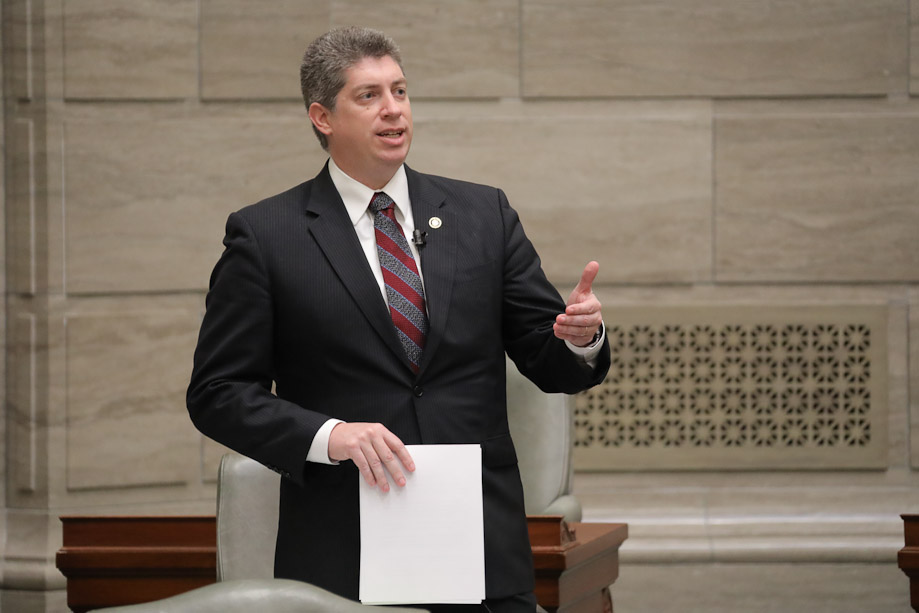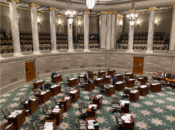JEFFERSON CITY, Mo. — Eight hours of debate — and an evacuation of the Capitol due to a fire alarm — ultimately resulted in the perfection of a sweeping bill related to law enforcement officers and protestors.
A tweaked version of SB 26 from Sen. Bill Eigel was advanced by the Senate after an evening of robust debate lasting until shortly after 1 a.m. Tuesday.
Among other things, the bill prohibits someone convicted of a dangerous felony that endangered the life of a first responder who is in the line of duty from probation eligibility. It also creates the offense of unlawful traffic interference if someone impedes or blocks traffic on a public street, highway, or interstate highway.
After the bill was amended on the floor, the offense of unlawful traffic interference for the first violation is an infraction; the second violation is a class B misdemeanor, and any other offenses is a class E felony.
The penalties are increased if a person commits an offense of unlawful traffic interference while engaging in an “unlawful assembly,” which is defined as when an individual gathers in a group of at least six people and “agrees … to violate any of the criminal laws of this state or of the United States with force or violence.” The first instance is an infraction. But a second violation is a class A misdemeanor, and a third violation is a class D felony.
The provision sparked a debate of safety versus spontaneity among Eigel and Sen. Karla May, who also argued the new offense under the original version of SB 26 would infringe upon the First Amendment rights of those who wish to protest.
“You can’t silence the voice of people or silence the voice of change,” May said. “We want those voices because they do usher us into change. … These people are dying in the street because of over-abusive power. We have to allow the change.”
Additionally, the bill adds to the offense of institutional vandalism should someone deface a public monument or structure on public property.
As was pointed out in floor debate, there has been a growing movement to eradicate Confederate monuments from public areas. Sen. Rick Brattin, a Republican, said this provision is meant to eliminate the “vigilantism of tearing down” those statutes and monuments.
SB 26 also allows taxpayers to request an injunction if a governing body decreases its law enforcement budget by more than 12 percent relative to budgets for other departments over a five year aggregate amount.
Additionally, Eigel’s legislation establishes a “bill of rights” for law enforcement officers, adding protections for those who are under investigation or subjected to questioning that could result in disciplinary action or dismissal. Under this bill, an officer would need to be notified in writing about the alleged violation and who would be conducting the investigation at least 24 hours before interrogation. Questioning would occur when an officer is on duty, in most circumstances, and at a secure location and by two officials.
The bill also adds protections for those who bring a complaint against a law enforcement officer, including for members of the same agency or department. It mandates any identifying information shall be held in camera by the investigating agency.
The ACLU of Missouri testified before lawmakers in opposition to this bill earlier this year, arguing against a few provisions.
“Protecting the due process rights of all is important; however, equality before the law is paramount,” Mo Del Villar, policy associate for the ACLU of Missouri, said. “We must not afford law enforcement officers particular privilege simply by nature of their employment, especially when they are being investigated for failures in the course of their duty.”
The debate over the bill was briefly interrupted by a fire alarm that rang out throughout the Capitol around 6:30 p.m. The Capitol was briefly evacuated before the Jefferson City Fire Department and Capitol Police gave the all clear for everyone to go back inside. It’s unclear what caused the alarm to go off; police sources said it originated on the third floor and was being investigated by fire officials.
BREAKING: The Capitol is being evacuated as fire alarms are going off throughout the building. #moleg #mogov pic.twitter.com/qCzzAYgNUR
— Kaitlyn Schallhorn (@K_Schallhorn) February 23, 2021
Part of the floor debate centered on an amendment from May. The Senate substitute perfected early Tuesday morning included her “988 Public Safety Fund” to be used for mental health treatment and aid for officers.
The Senate finally adjourned shortly after 1 a.m. SB 26 will need final approval from the upper chamber before it heads to the House.

Kaitlyn Schallhorn was the editor in chief of The Missouri Times from 2020-2022. She joined the newspaper in early 2019 after working as a reporter for Fox News in New York City.
Throughout her career, Kaitlyn has covered political campaigns across the U.S., including the 2016 presidential election, and humanitarian aid efforts in Africa and the Middle East.
She is a native of Missouri who studied journalism at Winthrop University in South Carolina. She is also an alumna of the National Journalism Center in Washington, D.C.
Contact Kaitlyn at kaitlyn@themissouritimes.com.



















